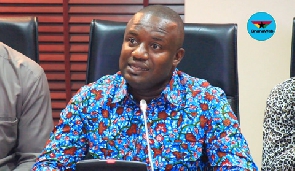 Former deputy power minister, John Jinapor
Former deputy power minister, John Jinapor
On May 5, 2015, government agreed to allow a private firm to manage the Electricity of Ghana (ECG) between 20 to 25 years.
The then deputy Power Minister, John Jinapor explained that the move did not mean the government has sold ECG.
During a procurement seminar held in Accra, John Jinapor said, “Let me quickly state that it does not mean we are selling ECG; the assets of ECG, all the properties of ECG will remain as they are.”
"A chunk of the money in the five-year compact is to be invested in improving the governance and management of the ECG, by bringing in a private sector operator to help reduce losses and improve service quality."
Read the full story originally published on May 5, 2015 by B&FT
Government has finally settled on a concession arrangement that will see a private firm operate and manage the Electricity of Ghana (ECG) for a possible 20 to 25 year period.
According to Deputy Power Minister John Jinapor, Cabinet has approved the model and government will choose a transaction adviser for the details and modalities in deciding on a concessionaire that will be required to, among other things, invest in the ECG.
“Let me quickly state that it does not mean we are selling ECG; the assets of ECG, all the properties of ECG will remain as they are,” Mr. Jinapor told journalists at a procurement seminar organised in Accra by the Millennium Challenge Corporation, which is overseeing execution of the US$498million Ghana Power Compact.
The involvement of a private firm in the affairs of the ECG is part of the conditions under which America agreed the second compact.
A chunk of the money in the five-year compact is to be invested in improving the “governance and management” of the ECG, by bringing in a private sector operator to help reduce losses and improve service quality.
“The ECG will be put on tender and a concessionaire will be selected to operate and manage it for a number of years,” CEO of the Millennium Challenge Authority, Owura Kwaku Sarfo, told the B&FT.
“It is going to be like the Ghanaian ‘Abusa’ system, whereby the landowner still owns the land but gives it to somebody who farms on that land; and at the end of the day, the person shares the proceeds with the landowner. In this particular case, they will come in and invest over the period of the concession, and concessions are normally between 20 and 25 years,” he explained.
“A management contract is different, whereby you bring in a team of professionals only to manage; they will not undertake any investments but under a concession - in fact before the concessionaire is chosen he has to indicate the stream of investments he will put into the system over the 20-year period to improve service delivery, to improve the whole system.”
A “rigorous tendering system”, Ing. Sarfo said, will be employed in arriving at a concessionaire, and the company to be chosen will be the one that provides the best option in terms of governance, management and investments.
Asked how the new arrangement will affect the workers of ECG, Ing. Sarfo responded thus: “Ideally, it should not affect the workers; but I do not have all the details because it has to be worked out. What the compact says is that the concessionaire will have to ensure equitable treatment of workers, and that’s what is going to happen.”
To demonstrate its commitment to the power compact, the government of Ghana has also pledged to invest at least US$37.4million of its own money as counterpart funding.
According to the Millennium Challenge Corporation, the compact could facilitate the injection of at least US$4.6billion in private energy investment and activity from American firms over the coming years.
Already, America’s General Electric (GE) has been working to roll out a 1,000megawatt power project in the country, valued at over US$1billion.